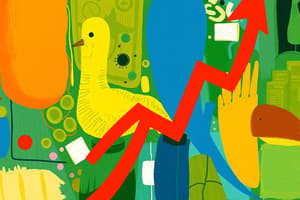Podcast
Questions and Answers
Flashcards
Gross Domestic Product (GDP)
Gross Domestic Product (GDP)
The total monetary value of all goods and services produced within a country or territory during a specific time period.
Production
Production
The process of turning raw materials or inputs into goods and services.
Consumption
Consumption
The act of buying and using goods and services.
Economy
Economy
Signup and view all the flashcards
Barter System
Barter System
Signup and view all the flashcards
Double Coincidence of Wants
Double Coincidence of Wants
Signup and view all the flashcards
Entrepot Trade
Entrepot Trade
Signup and view all the flashcards
Knowledge-Based Economy
Knowledge-Based Economy
Signup and view all the flashcards
Hong Kong's Four Pillars
Hong Kong's Four Pillars
Signup and view all the flashcards
Trading and Logistics
Trading and Logistics
Signup and view all the flashcards
Financial Services
Financial Services
Signup and view all the flashcards
Producer and Professional Services
Producer and Professional Services
Signup and view all the flashcards
Tourism
Tourism
Signup and view all the flashcards
Upward Social Mobility
Upward Social Mobility
Signup and view all the flashcards
High Purchasing Power
High Purchasing Power
Signup and view all the flashcards
Monotonous Economic Structure
Monotonous Economic Structure
Signup and view all the flashcards
Over-Reliance on Four Pillars
Over-Reliance on Four Pillars
Signup and view all the flashcards
Recession Impact
Recession Impact
Signup and view all the flashcards
Limited Opportunities for New Industries
Limited Opportunities for New Industries
Signup and view all the flashcards
Unemployment Rate
Unemployment Rate
Signup and view all the flashcards
Relationship between Unemployment and Economy
Relationship between Unemployment and Economy
Signup and view all the flashcards
Inflation and Unemployment
Inflation and Unemployment
Signup and view all the flashcards
Inflation
Inflation
Signup and view all the flashcards
Rate of Inflation
Rate of Inflation
Signup and view all the flashcards
Standard of Living
Standard of Living
Signup and view all the flashcards
Quality of Life
Quality of Life
Signup and view all the flashcards
Nominal Wages
Nominal Wages
Signup and view all the flashcards
Real Wages
Real Wages
Signup and view all the flashcards
Negative Impact of Higher Inflation on Standard of Living
Negative Impact of Higher Inflation on Standard of Living
Signup and view all the flashcards
Why Does Inflation Hurt Businesses?
Why Does Inflation Hurt Businesses?
Signup and view all the flashcards
Trade War Impact on Hong Kong
Trade War Impact on Hong Kong
Signup and view all the flashcards
Positive Non-Intervention
Positive Non-Intervention
Signup and view all the flashcards
When Government Should Intervene
When Government Should Intervene
Signup and view all the flashcards
Government Intervention Examples
Government Intervention Examples
Signup and view all the flashcards
Monopolies
Monopolies
Signup and view all the flashcards
Income Disparity
Income Disparity
Signup and view all the flashcards
Government's Duty to Underprivileged
Government's Duty to Underprivileged
Signup and view all the flashcards
Economic Stimulation
Economic Stimulation
Signup and view all the flashcards
Export-Oriented Economy
Export-Oriented Economy
Signup and view all the flashcards
Free Capital Flow
Free Capital Flow
Signup and view all the flashcards
Impact of Global Events on Economy
Impact of Global Events on Economy
Signup and view all the flashcards
SARS and COVID-19 Impact
SARS and COVID-19 Impact
Signup and view all the flashcards
Global Financial Crisis Impact
Global Financial Crisis Impact
Signup and view all the flashcards
European Debt Crisis Impact
European Debt Crisis Impact
Signup and view all the flashcards
Real vs. Nominal Wages
Real vs. Nominal Wages
Signup and view all the flashcards
Study Notes
Gross Domestic Product (GDP) and the Economy
- GDP is the total monetary value of goods and services produced by a country or territory in a specific time period.
- Production describes how raw materials are transformed into goods and services.
- Consumption describes how people buy and use goods and services.
- An economy encompasses a country's or region's production and consumption of goods and services, along with the money supply.
- Key features of an economy include production of goods and services, consumption of goods and services, and the use of money as a medium of exchange.
The Role of Money
- Before money, people exchanged goods and services through bartering.
- The double coincidence of wants was a problem with bartering, leading to the development of money.
The Economy of Hong Kong
- Hong Kong initially relied on entrepot trade.
- Now, it's a knowledge-based economy, relying on information, creativity, and technology, as vital growth sources.
- Key pillars of Hong Kong's economy include trading, logistics (e.g., trucks, airplanes), financial services (e.g., banking, insurance, investment), and producer-based and professional service industries (e.g., accounting, legal, medical, tourism).
Positive Aspects of the Four Pillars Industries
- High-quality, improving pillar industries attract much of Hong Kong's money and talented people.
- This fosters expertise, trains talent, and enhances the quality of these industries.
- The industries generate substantial income and purchasing power, enabling the development of the consumer market (e.g., retailing, entertainment).
- The high income allows people to advance in social standing.
Drawbacks of Over-reliance on The Four Pillar Industries
- An over-reliance can lead to a monotonous economic structure.
- Economic risks increase if one pillar experiences a downturn; an economic recession can affect the overall economy.
- Limited opportunities for new industry development due to higher wages, increased rents, and difficulties for newer businesses.
- Marginalization of workers with lower skills and education due to the high demand for those in the pillar industries, hindering their ability to earn a living.
Rate of Unemployment
- Unemployment rate is the proportion of unemployed individuals in the labor force (aged 15 and above).
- A strong economy usually results in a low unemployment rate, while a weak economy usually results in a high unemployment rate.
- When the economy is strong, most people have jobs and more to spend, growing business profits and investment. This leads to increased GDP.
- When the economy is weak, unemployment rises due to reduced business profits and investment, decreasing GDP.
Rate of Inflation
- Inflation refers to the prolonged increase in the prices of most goods and services.
- The rate of inflation indicates the speed at which prices are growing.
- The quality and quantity of goods and services indicate the standard of living.
- The quality of life in Hong Kong goes beyond just the standard of living to include intangibles like freedom, human rights, and a clean environment.
- Inflation that outpaces wage increases reduces the quality of life even if wages increase.
Capital Flow and Hong Kong
- Hong Kong's small size and lack of natural resources make it reliant on capital flow.
- Hong Kong allows for capital flow, attracting foreign investors.
- Hong Kong's economy depends on producing goods and services and selling them to overseas markets.
Effects of Overseas/Global Events
- Hong Kong's export-oriented economy is vulnerable to events occurring in other parts of the world (e.g., SARS, the 2008 global financial crisis, the 2020-2022 COVID-19 pandemic, and the US-China trade war).
- These events can significantly impact Hong Kong's tourism, retail, and other industries, making investors hesitant.
Positive Non-Intervention
- Hong Kong's markets are better at allocating resources efficiently without government interference when they work correctly.
- A well-functioning market keeps production costs and service delivery fast for those who can afford them.
- Government intervention is needed in specific cases to prevent market chaos, reduce monopolies exploitation, and regulate income disparities.
- Government intervention is also needed for supporting the underprivileged and creating jobs to achieve socioeconomic stability.
Studying That Suits You
Use AI to generate personalized quizzes and flashcards to suit your learning preferences.




